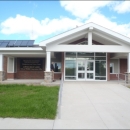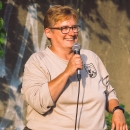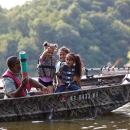We recognize the value and need for public support and participation for the success of its programs and is committed to working with the public as a partner. Outreach provides an opportunity to highlight the successes of our office and educate the public about environmental issues in Lakes Erie and Ontario. We seek to educate, inform, and improve the public’s awareness to promote informed decision-making and a better understanding of the role each of us plays in our natural environment from our cities to our lakes.
Outreach and education projects include presenting at area schools and environmental fairs and participating in various events that showcase our office’s projects and feature local environmental organizations with a special emphasis toward hands-on activities for children. The is also an active partner with Iroquois NWR and several other groups in the Buffalo Urban Wildlife Refuge Partnership: Where History Meets Nature.Through this new partnership, we aspire to build and sustain meaningful collaboration between community organizations, public agencies, and private institutions committed to supporting urban conservation efforts through a cultural, social, and historical lens thus fostering future land stewards who will promote behaviors that sustain healthy environments for people, wildlife, lands, and waters.







